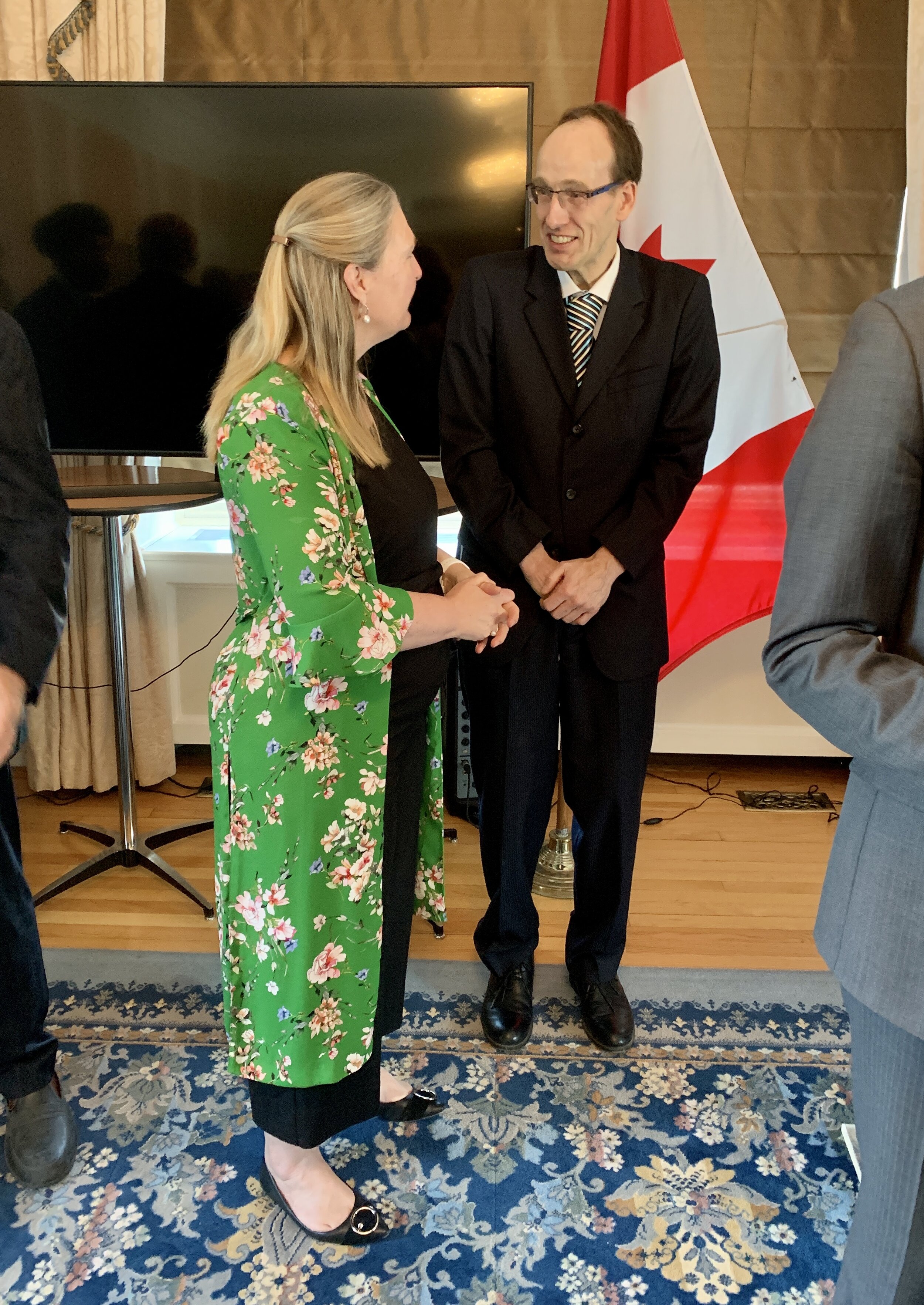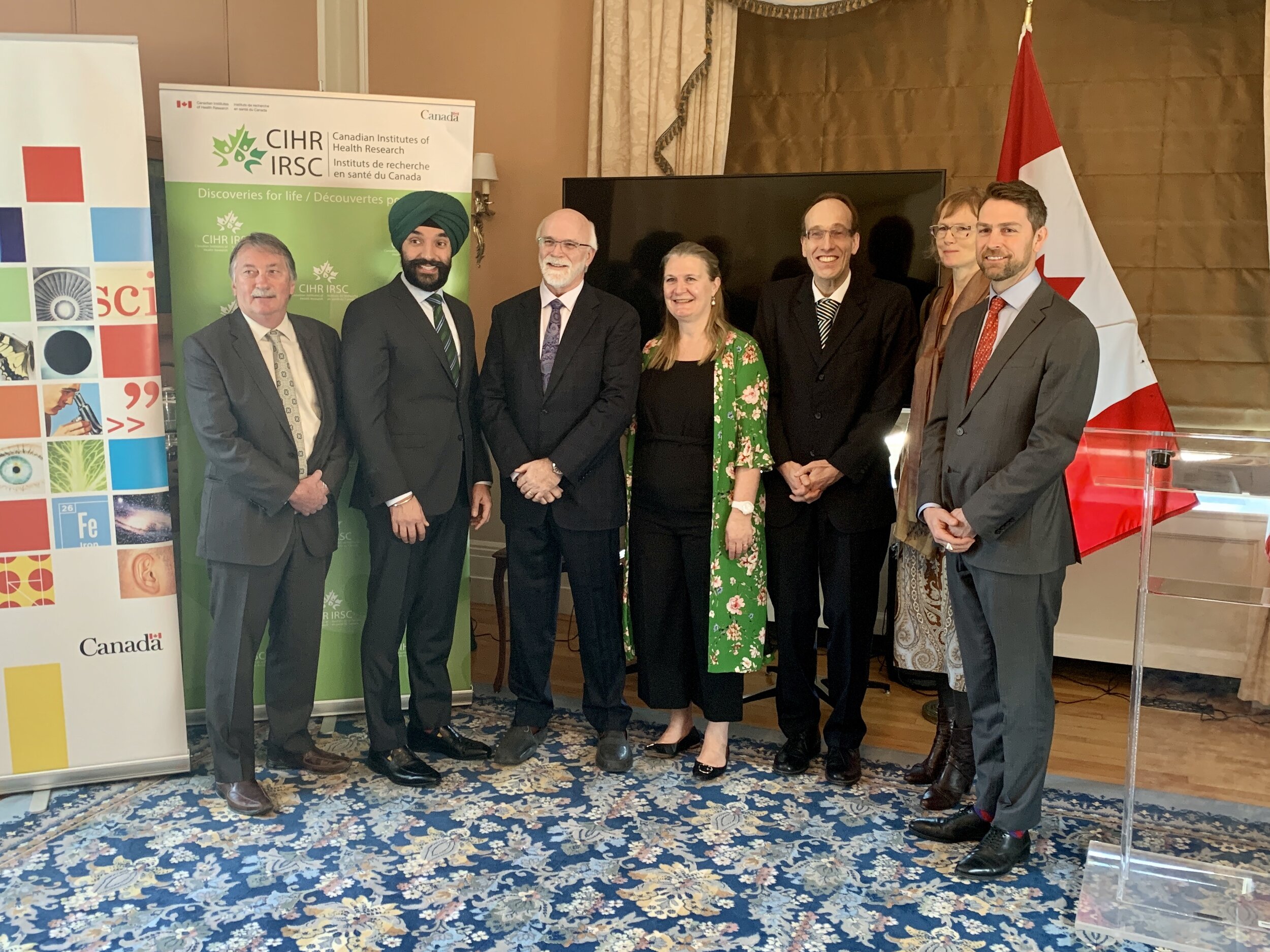I was featured in German TV show “Aspekte” on channel ZDF
Read an interview with Piąte Piętro about consciousness, the world-brain relationship, and embodiment.
Our research has received an outstanding review summary by ScholarGPS
Read a good discussion of “why we are looking at the brain all wrong”, and why our spatiotemporal approach might be a viable way out in this blogpost by Thomas W. Moore.
Read an interview with the italian magazin OSO on Kant, the insula, the default mode network and other things
A good summary of our overall approach to the bain and mind and their relation has recently been featured in the Ottawa Citizen.
Interview with a student from the ESCP Buisness School in Paris/Turino March 2022
Read the summary here
Does a person's external environment or personal relationships impact this brain/mind connection? If yes, how so?
Dr. Northoff joins 50 leaders recognized for outstanding scholarly, scientific and artistic achievement.
Read the article here
Dr. Georg Northoff has been elected a Fellow of the Royal Society of Canada (RSC), the senior collegium of distinguished scholars, artists and scientists in the country. Read more here.
Space, time: bridging the epistemic gap of brain & mind
By Anna Holm Sep 23, 2020
It is a great honour to be placed in the top 0.1% of scholars writing about the Cerebral Cortex over the past 10 years, a level that is labelled as "Expert” by Expertscape
In a recent paper, we could show that the visual cortex represents a novel therapeutic target region for rTMS treatment in majr depressive disorder. rTMS to the visual cortex can counteract the abnormal increase in functional connectivity between the visual cortex to the anterior cingulate cortex in major depression after only 5 days of treatment and correlated with symptomatic reduction. Furthermore, the stimulation was well tolerated by all patients. Read the full paper here.
Our paper on the lost hierarchy of the autistic self made the cover of Brain Sciences.
Read the paper here
The Lost Neural Hierarchy of the the Autistic Self
Participants suffering from autism show self-paradoxical symptoms. On one hand, they are isolated from others and focus only on themselves especially on body and its physical self. On the other hand, they rarely refer to themselves in the first-person, they display weak autobiographical memory, and they are unaware of their own emotional feelings – their mental self is weakened. What is the neural basis of such paradoxical symptoms? This review highlights the consistent hypofunction in anterior and posterior regions of the default-mode network (DMN) in both rest and task with decreased self-non-self differentiation – this relates to the weakened mental self. While, at the same time, the non-DMN and subcortical regions are relatively stronger increasing subjects’ focus on their physical self. We conclude that the nested neural hierarchy of physical and mental self is disrupted in autism which leads us to postulate a new model, the lost “Hierarchy of the Autistic Self” (HAS).
Federico Zilio talks about the temporo-spatial approach to consciousness, and how the power law exponent (PLE) and the autocorrelation window (ACW) differ in various states of impaired consciousness.
3 implausible presuppositions of the hard problem
Is consciousness as mysterious as suggested by the hard problem?
In a nutshell, the hard problem of consciousness raises the question of why and how consciousness could exist and be real in an otherwise non-conscious world. Sometimes it is erroneous to search directly for answers to the question itself. Instead, it may be more fruitful to question the question: are the basic assumptions of the hard problem viable and plausible? Read more…
Does your brain activity give you away?
Dr. Annemarie Wolff has won a Governor General’s Gold Medal for outstanding academic achievement in Medicine, Health Sciences and Interdisciplinary Studies for her neuroscience PhD thesis, Neural Mechanisms of Individuality – EEG studies in self and morality. Her graduate work at the Faculty of Medicine’s Department of Cellular and Molecular Medicine looked for markers in brain activity that could distinguish healthy individuals from each other based on how they perceive, feel, and perform cognitive tasks.
Beyond the Books Ep. 3: Neuroscience and Neuroethics with Dr. Georg Northoff
The three implausible presuppositions of the hard problem
IAI, Issue 86, 16th March 2020
Alternate Activation of Two Brain Systems Tied to Consciousness
By Ruth Williams Mar 12, 2020
The self and its mediation - Spontaneous brain activity and its temporo-spatial features
10th September 2019, Oslo Norway, Arcem Forum
Solving the World-Brain Problem
by Filip Stawski, Mateusz Tofilski
Bydgoszcz Philosophical Magazine, April 2019
by Ella Rhodes, The Psychologist journal
Feeling Yourself, interview with Dr. Northoff in a podcast from Klipsun magazine
On this episode of Klipsun Out Loud, Walker Sacon explores neurophilosophy and the neuroscience of self with renowned neuroscientist and philosopher Georg Northoff.
Dr. Northoff is interviewed at the Integrated Neuroethics Research with Dr. Matthew A. Butkus
Catatonia: A Guide for Clinicians
Royal College of Psychiatrists
Slides form a talk given in 2016
Exploring Neuro-Philosophy: A David Van Nuys interview with Georg Northoff
The Neuropsychotherapist
Research could lead to new, individualized treatment for bipolar disorder
Link
Ottawa-led breakthrough could hold key to 'holy grail' of depression research
Link
Dr. Northoff is interviewed on Health Headlines with Dr. Barry Dworkin
Report on Georg Northoff speaking on Cultural Neuroscience at NIH Seminar Series
Link
University of Ottawa Faculty of Medicine Gala: A Night of Magic and Medicine.
Link with pictures
RCI Interview on Suicide with Dr. Georg Northoff
Link
CJAD Radio Interview
Depression
Interview with Dr. Georg Northoff
Radio Interview News Talk 610
Where does hopeless live in your brain?
Ottawa Citizen, August 14, 2014
The Brain and Chocolate Cake
A coffee house conversation from Minding the Brain.
TVO: The Agenda, January 21, 2014
The Mysteries of the Mind
New views of the unconscious are giving fresh insights on how it serves as a resource for the conscious in our everyday lives. In this second instalment of our Mysteries of the Mind series, The Agenda explores the unconscious.
View the recording at TVO
Radio Interview on CFRA Ottawa
Dr. Georg Northoff discusses early brain development and mental health with Steve Madely on CFRA Ottawa.
“Who do we think we are?”
Journal of discovery and innovation from the University of Ottawa, Fall 2011
The Globe and Mail:
"Mental illness ‘a tsunami of economic loss’ in the workplace"
Barrie McKenna, Lisa Priest
Published Wednesday, Dec. 07, 2011
“The brain relates us to the environment via its resting state activity”
Center for Process Studies, 10/6/11
Follow this link to see the first part of the video.
New study looks at preventing suicide
Jessica Smith, Metro News
Published: October 19, 2011 11:37 p.m.
Dr. Georg Northoff, director of the Mind, Brain Imaging and Neuroethics Unit of the Royal Ottawa Mental Health Centre, is leading a large study of teenage and college-age students who have suicidal thoughts or have attempted suicide in the past. Read article.
CTV, Canada am: NHL suicides show no one immune to mental illness
Angela Mulholland, CTVNews.ca
Date: Wed. Oct. 5 2011 7:29 AM ET
This is the third instalment in Speak Out On Suicide series running on Canada AM and on canadaam.ctv.ca.
RCI, Radio Canada International
Brain imaging advances suicide research
A Canadian neuroscientist is using brain imaging to try to unlock the secrets of suicide. Dr. Georg Northoff suggests that suicidal patients are unable to project themselves into the future and succumb to the hopelessness of the moment. The Link's Lynn Desjardins tells us about Dr. Northoff's findings and how his research might help treat suicidal patients in the future.
Link to the interview here
The Arlene Bynon Show, 28.09.2011
Talk Radio AM640
Listen Online @ www.640toronto.com
Interview with Georg Northoff
Breaking Through (Volume VI, Issue 3– Sept, 2011)
The Gruesome Grey Pulp
When: 25 JUNE, THE 12TH INTERNATIONAL NEUROPSYCHOANALYSIS CONGRESS, BERLIN
The Gruesome Grey Pulp
A scientific screwball musical comedy (see details here)
When:
Monday, April 25, 2011 at 7 pm
Where:
Great Canadian Theatre Company
1227 Wellington Street West
What is it to be “human”?
Is it merely the ability to think? Or is it also how we feel? If you’re George, a neuroscientist, it all boils down to our brain and how its different circuits control our actions and thoughts. If you’re Liz, a psychoanalyst, being human is more than just what lies between our ears — it’s about emotions and living.
Featuring Dr. Georg Northoff playwright, world-renowned neuroscientist and Canada Research Chair, University of Ottawa, internationally recognized actress Elisabeth Eschwé and highly acclaimed composer John Sarkissian.
Tickets:
$45 per person, includes a dessert reception
Call 613.236.5196 to purchase your tickets today
Ottawa Citizen: Depressed sector
(September 23, 2010)
Compassion alone would be reason enough for the federal public service, the biggest employer in Ottawa, to address the problem of depression that appears to afflict many of its workers. But there's another incentive: mental illness has a huge price tag attached to it, as measured in lost productivity and other costs.
Link to article
Ottawa Citizen: "Royal Ottawa to take on depression with state-of-the-art $25 million centre",
by Pauline Tam
At a time when budget pressures are forcing Ontario hospitals to rein in spending, the Royal Ottawa Health Care Group is drawing up plans for a $25 million research centre devoted to improve the diagnosis and treatment of depression.
The Rob Breakenridge Show
Corus Entertainment Radio, AM 770 CHQR Calgary, Alberta
Interview with Dr. Northoff
Ottawa Citizen: Human brain can never be certain about God: scientist
One of the world's foremost neuroscientists is about to tell some of the world's foremost theologians the bad news: God may exist, but the human brain is simply not capable of knowing that for sure [...].
Link to the article
Breaking Through (Volume V, Issue I– January, 2010)
Celebrating Dr. Northoff’s EJLB-CIHR Michael Smith Chair
Mental Health Symposium - Minds Across Canada
First Friday Lecture Series - A Focus on Ethics
Ottawa Citizen: Ottawa's Brain Gain
The University of Ottawa Institute of Mental Health Research spent two years wooing Dr. Georg Northoff, who 'hit the road running' and, after only a month, has recruited 12 other scientists to work with him in decoding the brain [...].
Link to article
Breaking Through (Volume IV, Issue IV – June-July, 2009)
Introducing the Mind, Brain Imaging and Neuroethics Research Unit.
The Ottawa Citizen: Imaging opens biology's final frontier
The University of Ottawa Institute of Mental Health Research wants to join a technological revolution that holds tantalizing promise for the diagnosis and treatment of mental illness.
CBC Radio Ottawa
Interview with Georg Northoff.











